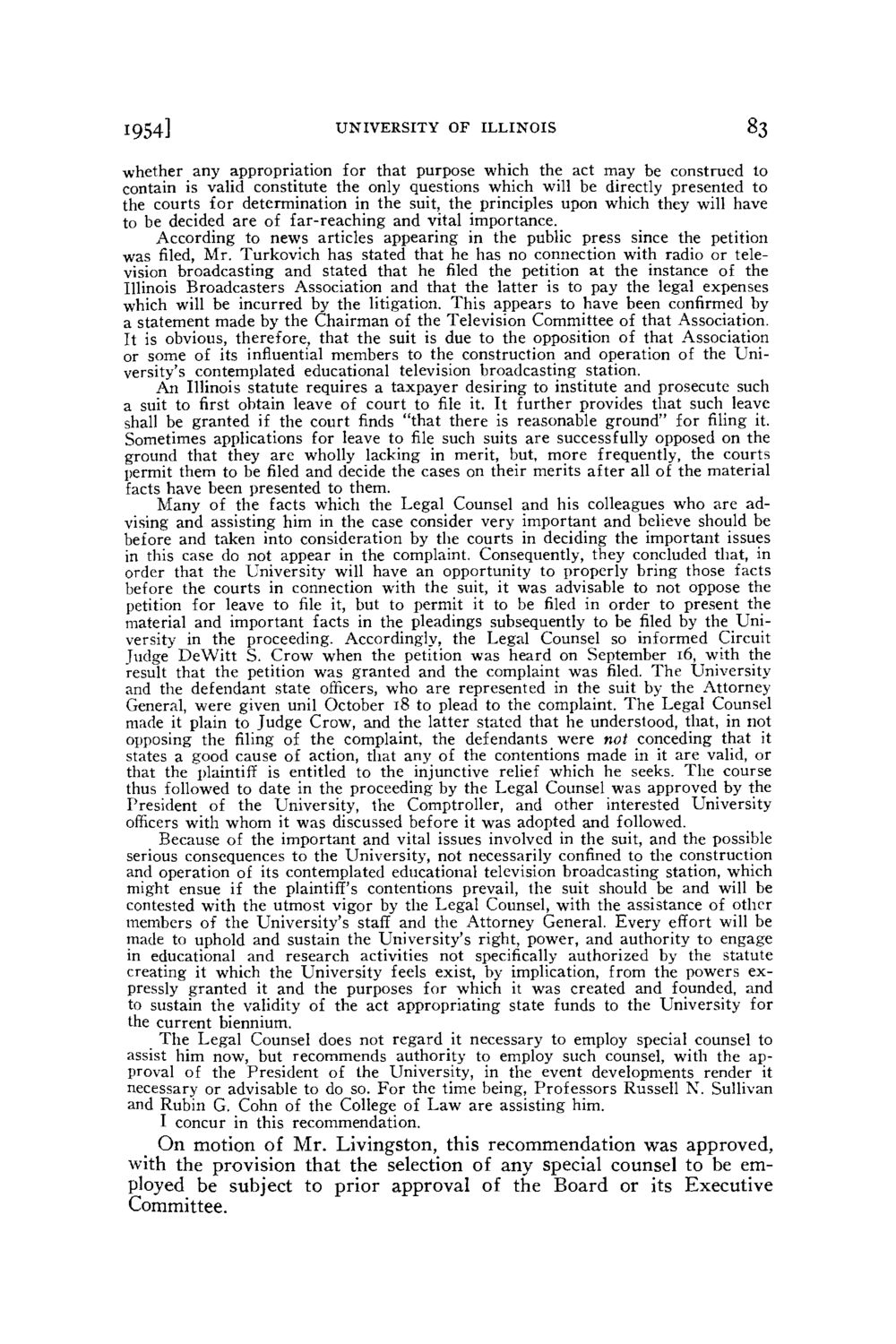| |
| |
Caption: Board of Trustees Minutes - 1956
This is a reduced-resolution page image for fast online browsing.

EXTRACTED TEXT FROM PAGE:
1954] UNIVERSITY OF ILLINOIS 83 whether any appropriation for that purpose which the act may be construed to contain is valid constitute the only questions which will be directly presented to the courts for determination in the suit, the principles upon which they will have to be decided are of far-reaching and vital importance. According to news articles appearing in the public press since the petition was filed, Mr. Turkovich has stated that he has no connection with radio or television broadcasting and stated that he filed the petition at the instance of the Illinois Broadcasters Association and that the latter is to pay the legal expenses which will be incurred by the litigation. This appears to have been confirmed by a statement made by the Chairman of the Television Committee of that Association. It is obvious, therefore, that the suit is due to the opposition of that Association or some of its influential members to the construction and operation of the University's contemplated educational television broadcasting station. An Illinois statute requires a taxpayer desiring to institute and prosecute such a suit to first obtain leave of court to file it. It further provides that such leave shall be granted if the court finds "that there is reasonable ground" for filing it. Sometimes applications for leave to file such suits are successfully opposed on the ground that they are wholly lacking in merit, but, more frequently, the courts permit them to be filed and decide the cases on their merits after all of the material facts have been presented to them. Many of the facts which the Legal Counsel and his colleagues who are advising and assisting him in the case consider very important and believe should be before and taken into consideration by the courts in deciding the important issues in this case do not appear in the complaint. Consequently, they concluded that, in order that the University will have an opportunity to properly bring those facts before the courts in connection with the suit, it was advisable to not oppose the petition for leave to file it, but to permit it to be filed in order to present the material and important facts in the pleadings subsequently to be filed by the University in the proceeding. Accordingly, the Legal Counsel so informed Circuit Judge DeWitt S. Crow when the petition was heard on September 16, with the result that the petition was granted and the complaint was filed. The University and the defendant state officers, who are represented in the suit by the Attorney General, were given unil October 18 to plead to the complaint. The Legal Counsel made it plain to Judge Crow, and the latter stated that lie understood, that, in not opposing the filing of the complaint, the defendants were not conceding that it states a good cause of action, that any of the contentions made in it are valid, or that the plaintiff is entitled to the injunctive relief which he seeks. The course thus followed to date in the proceeding by the Legal Counsel was approved by the President of the University, the Comptroller, and other interested University officers with whom it was discussed before it was adopted and followed. Because of the important and vital issues involved in the suit, and the possible serious consequences to the University, not necessarily confined to the construction and operation of its contemplated educational television broadcasting station, which might ensue if the plaintiff's contentions prevail, the suit should be and will be contested with the utmost vigor by the Legal Counsel, with the assistance of other members of the University's staff and the Attorney General. Every effort will be made to uphold and sustain the University's right, power, and authority to engage in educational and research activities not specifically authorized by the statute creating it which the University feels exist, by implication, from the powers expressly granted it and the purposes for which it was created and founded, and to sustain the validity of the act appropriating state funds to the University for the current biennium. The Legal Counsel does not regard it necessary to employ special counsel to assist him now, but recommends authority to employ such counsel, with the approval of the President of the University, in the event developments render it necessary or advisable to do so. For the time being, Professors Russell N. Sullivan and Rubin G. Cohn of the College of Law are assisting him. I concur in this recommendation. On motion of Mr. Livingston, this recommendation was approved, with the provision that the selection of any special counsel to be employed be subject to prior approval of the Board or its Executive Committee.
| |